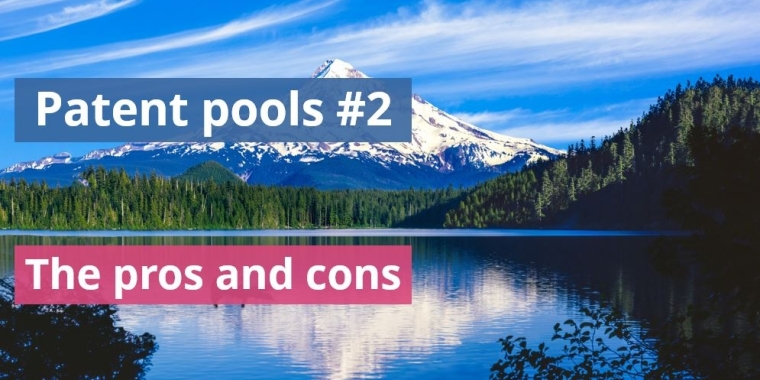Wed 4th Aug 2021
The pros and cons of standards-based patent pools
Services: Applying for a patent overseas, Board support and consultancy, Innovation capture, International reach, IP licensing, IP portfolio management, IP strategy, Obtaining a patent, Patents, Preparing for funding or flotation, Start up or scale up
Sectors: Cleantech and renewables, Electronics and telecoms, Materials science, Mechanical engineering, Software patents
Patent pools have a long history, and one of the first patent pools was formed in 1856 for sewing machines. These days they form an important part of the basis for industry standards in regard to technologies which are necessary (essential) to develop compatible products and services. Examples can be seen in the fields of mobile communications, information coding, public health etc. and they often relate to technologies that are yet to be fully developed.

Over the years the use of patent pools has evolved, and they are generally recognised as beneficial and contributing to increased efficiencies, although there are sometimes concerns that the creation of a patent pool may be anti-competitive.
Olaf Ungerer, a German and European Patent Attorney in Munich, summarises the benefits and disadvantages of standards-based patent pools in the second of a series of articles on the subject (see the first article on how patent pools operate).
Olaf is a member of the German GRUR committee on patents and utility models, which is currently supporting the German Federal Ministry of Justice and Consumer Protection in connection with a contribution paper about a consultation on standards essential patents (SEPs) with the European Commission. The below article is derived from this publicly available contribution paper. For more information, see the ‘SEP Experts Group’ paper Contribution to the Debate on SEPs.
Overarching advantages of a patent pool
Patent pools are generally advantageous in that negotiations for patent licences can be achieved more efficiently.
Some early patent pools in the consumer electronic fields for optical storage standards (CD, DVD), and audio- and video compression standards (like MPEG-2, MPEG-4, AVC and AAC) have been very successful in generating substantial amounts of licensing revenues.
Negotiations for a patent licence through the patent pool require only negotiation with a single agent managing the pool. This eliminates a lot of effort and transaction costs that would otherwise be incurred if negotiating with each patent holder individually.
Importantly, accumulation of patent fees is avoided, since the patent pool ensures that there is no escalation in licence fee even when many patents are involved.
Benefits of standards-based patent pools
Various studies mention the following non-exhaustive list of potential benefits of licensing standards essential patents (SEPs) through patent pools.
- Reducing transaction costs by allowing licensees to conclude only a single pool licence for multiple licensor portfolios and avoiding reporting and paying royalties separately for each licensor (i.e., having one reporting and payment process for the collective portfolio).
- Offering a reasonable aggregate royalty for SEP portfolios of multiple licensors.
- Reducing discrimination among licensees by offering licences on standard pre-set terms and conditions.
- Helping attenuate concerns over potential patent hold-up by individual licensors due to the reasonable aggregate royalties offered by patent pools.
- Providing more certainty regarding the essentiality of the patents being licensed through the pool as a result of the required independent evaluation of at least some purportedly essential patents from each licensor’s portfolio.
- Reducing litigation costs for licensors by disincentivizing litigation among pool licensors and providing mechanisms for better coordination among licensors for enforcement of their patents against unwilling licensees, including possibly hiring joint counsel.
- Accelerating adoption of standardized technologies.
Problems arising from standards-based patent pools
On the other hand, the following downsides can be identified:
- Due to pre-approved terms and conditions, pools in most cases allow for less flexibility in negotiating terms and conditions of a SEP licence, within the bounds of the FRAND (fair, reasonable, and non-discriminatory) commitment.
- Patent pools may reduce a (potential) licensee’s incentives to challenge weak patents for non-essentiality or invalidity, because excluding these patents from the pool licence will likely not affect the pool royalty.
- Pools redistributing royalty revenues by numerical proportionality to pool members’ numbers of certified SEPs may incentivize opportunistic patenting strategies, which may (partly) offset the transaction costs savings generated by pools.
- Current patent pools, despite recognized advantages and built-in safeguards, present risks of producing negative effects on innovation and competition among different technologies. Even though evidence for unusually high patenting in reaction to pool creation can be shown, patents may not reflect innovation but may be subject to strategic patenting (opportunistic patenting).
- Finally, empirical evidence suggests that the rate at which SEPs are asserted in court increases after inclusion into a pool, and that pool licensors participated in a large share of SEP litigation cases in Europe.
How we can help
The team patent attorneys at Page White Farrer includes experts with deep knowledge of a wide range of technologies (see our sector specialisms) including standardized technologies. We advise inventors and companies on intellectual property strategy, which includes assessing whether licensing via a patent pool or offering patents to a pool would be commercially advantageous. We can also under-take an essentiality evaluation to determine whether a standard essential patent may be entered into a pool.
For more information on patent protection across Europe, please contact our expert attorneys by email to email@pagewhite.com.
This briefing is for general information purposes only and should not be used as a substitute for legal advice relating to your particular circumstances. We can discuss specific issues and facts on an individual basis. Please note that the law may have changed since the day this was first published in October 2021.
Author

